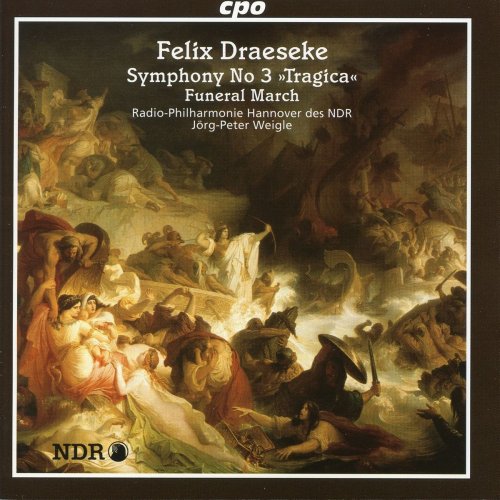
NDR RADIOPHILHARMONIE - Draeseke: Symphony No. 3, "Tragica" - Funeral March (2000)
BAND/ARTIST: NDR RADIOPHILHARMONIE
- Title: Draeseke: Symphony No. 3, "Tragica" - Funeral March
- Year Of Release: 2000
- Label: CPO
- Genre: Classical
- Quality: FLAC (tracks)
- Total Time: 54:49 min
- Total Size: 225 MB
- WebSite: Album Preview
Tracklist:
01. Symphonia Tragica, Op. 40: I. Andante - Allegro risoluto
02. Symphonia Tragica, Op. 40: II. Grave (Adagio ma non troppo)
03. Symphonia Tragica, Op. 40: III. Scherzo - Allegro molto vivace
04. Symphonia Tragica, Op. 40: IV. Finale - Allegro con brio
05. Funeral March in E Minor, Op. 79
01. Symphonia Tragica, Op. 40: I. Andante - Allegro risoluto
02. Symphonia Tragica, Op. 40: II. Grave (Adagio ma non troppo)
03. Symphonia Tragica, Op. 40: III. Scherzo - Allegro molto vivace
04. Symphonia Tragica, Op. 40: IV. Finale - Allegro con brio
05. Funeral March in E Minor, Op. 79
Johannes Brahms is said to have ranked Felix Draeseke (1835-1913) along with Anton Bruckner as his main symphonic rivals. While it is perfectly understandable that Brahms recognized Bruckner’s claim (despite dismissing his symphonies as “boa constrictors”), it’s difficult, on evidence of the present disc, to conceive that he found Draeseke to be any sort of threat at all. Perhaps the answer lies in the sheer craft with which Draeseke, like Brahms, constructs his tightly-knit, hard-wrought forms–but this is also where the problems lie. Clara Schumann’s complaint that Brahms’s First Symphony suffered from excessive “working out” is well deserved in considering Draeseke. Essentially what we have here is an attempt at brilliant, masterful thematic development of musical ideas that, for all their complexity, are of limited, or even negligible interest. Bruckner built powerful and dramatic works utilizing simple, yet irresistibly compelling themes. Draeseke seems to have missed that point in his quest for the German high-art symphony. Thus, after the first movement’s Beethoven-like introduction (which then meanders for a time) the allegro proper is a lesson in symphonic process–more accomplished than, say, Schumann, but far less captivating. The slow movement’s “Eroica”-inspired funeral march (there’s an original idea!) does feature some interesting repeating chords at dramatic moments, but the fullsome scherzo merely functions as a makeweight. This brings us to the “tragic” finale, which seemingly lasts way beyond its fifteen minute duration because of its oft repeated, boring tunes and a development section that offers no new insights into them. Had this symphony been composed at the time of Mendelssohn one could marvel at Draeseke’s “advanced” technique, but he (a noted admirer of Liszt and Wagner) composed it in 1886–around the same time Bruckner was composing his epoch-making Eighth! The appended Funeral March sounds curiously light-hearted and quick-moving for such an occasion, and is only slightly more interesting than the symphony. Jörg-Peter Weigle’s first-class performance with the Radio-Philharmonie Hannover des NDR is of such a caliber that none of the blame for the above impressions can be laid at his feet. CPO provides a well rounded recording with plenty of bloom. This one’s for believers in the inherent superiority of German music–they’ll enjoy the pompous and self-congratulatory liner notes as well.
As a ISRA.CLOUD's PREMIUM member you will have the following benefits:
- Unlimited high speed downloads
- Download directly without waiting time
- Unlimited parallel downloads
- Support for download accelerators
- No advertising
- Resume broken downloads


